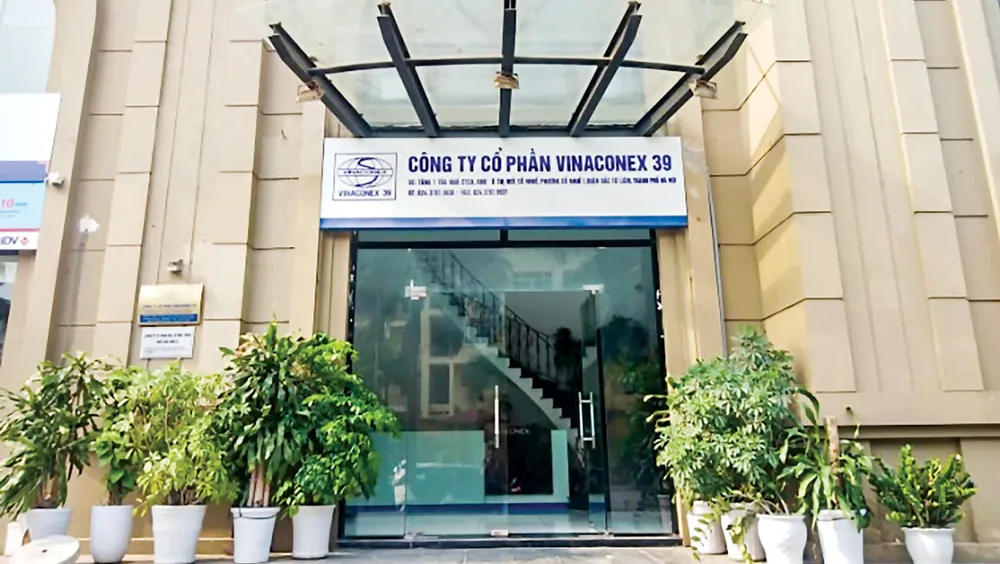
Several name changes
The Vinaconex 39 Joint Stock Company (PVV) was first registered as the Northern Transport Construction and Development Investment Joint Stock Company on 15 January 2007. The main businesses of PVV involved construction of residential and industrial projects, transportation, irrigation, leveling and foundation treatment projects, as well as electric works upto 35KV.
In May 2007, with capital contribution from Vietnam Construction and Export-Import Joint Stock Corporation (Vinaconex), PVV officially became a subsidiary of Vinaconex and was renamed Vinaconex Transport Development Investment Joint Stock Company 39. In January 2009, PVV received more capital from the Vietnam Petroleum Construction Joint Stock Corporation (PVC). With capital contribution of PVC and Vinaconex at 16.7% and 27%, respectively, PVV became an associate company and renamed to Vinaconex-PVC Construction Investment Joint Stock Company. By July 2017, PVV once again changed to its present name, Vinaconex 39 Joint Stock Company.
On 9 September 2010, PVV listed shares on the Hanoi Stock Exchange (HNX) at a reference price of VND 38,000 per share. Despite being on the floor at a time when the stock market was not favorable, PVV still recorded a relatively successful opening at closing session at VND 39,900 per share. The price of VND 39,900 per share is also the highest peak for PVV, because after the listing session this stock continued to decline and for the first time traded below par value on 31 May 2011. The subsequent fall of PVV only began after an unsuccessful restructuring plan and now the reference price of PVV on trading session is just VND 500 per share.
Illusions of power
The golden age for PVV was during the years 2008-2010, when the company received a lot of support from PVC and Vinaconex, with revenue of upto 390% per year and profit growth of upto 395% per year. In 2010 in particular, revenue and profit growth had reached 717% and 503%, respectively. This growth was due to PVV receiving a series of construction contracts and key projects upto VND 2,000 bn. These included the construction of underground parkings and commercial services in Thanh Cong, construction of Lam Kinh Hotel in Thanh Hoa, access roads to Thai Binh Thermal Power Plant, Dinh Vu Polyester Factory in Hai Phong, Vung Ang Thermal Power Plant, Phu Dat Apartments in Ho Chi Minh City, Nghi Son Petrochemical Refinery, Highway 21, Highway 3, and the Lang-Hoa Lac expressway.
With this impressive growth and the partnership with these two strategic shareholders, PVV set a goal of becoming an investment company under the group model. PVV strategy was to get revenue from construction activities so as to focus on real estate businesses. However, luck did not favor PVV when the real estate market suddenly crashed, resulting in a decline in construction demand. In 2012, PVV first experienced a loss with a negative after-tax profit of VND 48 bn. In 2013, PVV continued to lose an additional VND 99 bn.
In 2017, PVV decided to restructure, but this restructuring was still in the form of "old wine in new bottle". Specifically, PVV only changed its name, while the strategy was the same it had in 2011. This decision to restructure did not help PVV to reinvent but pushed the business into deeper losses in the following years. As a result, in 2019, PVV was forced to delist on HNX due to losses for three consecutive years. After the mandatory delisting on HNX on 3 June 2019, PVV put stock on trade on UCPoM at a reference price of VND 500 per share.
Preparing to face losses
Even after the stock was transferred on UPCoM, PVV shareholders continued to receive negative information about the company’s business results. According to the 2019 financial statement, PVV profits were negative at VND 33.4 bn. Notably, the financial statement of PVV received a series of comments from the audit firm on doubtful debts.
In 2019, even though the Board of Directors completed the restructuring of departments and streamlining the management to a minimum, they were still unable to overcome the difficulties facing the business. In presenting their business plan for 2020 at the General Meeting of Shareholders, the Board of Directors of PVV admitted that in the context of many difficulties the financial costs were high, and with no breakthrough in sight, the enterprise would see losses and negative equity this year.
The solutions provided by the Board of Directors only revolved around issues such as selling fixed assets to pay off debts, saving corporate management costs, and cutting down on unnecessary meetings. Unable to find solutions, PVV is now preparing to face a loss of VND 30 bn in 2020.




















